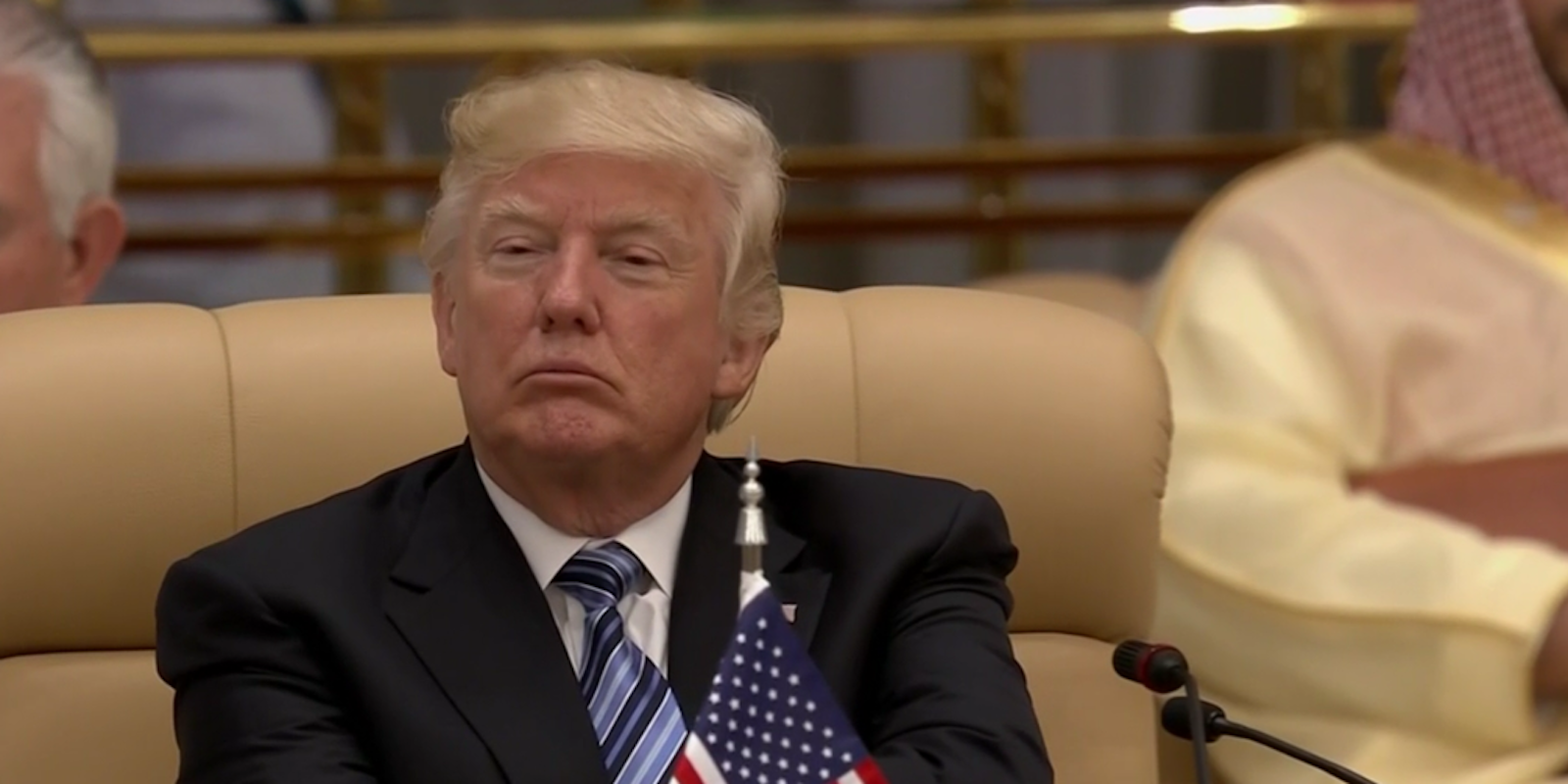President Donald Trump gave the first foreign address of his tenure on Sunday, speaking before an assembled group of Arab leaders at the Saudi Arabian capital of Riyadh. Thanks to a draft of the speech leaking a day prior, it was already known going in that, as written, the speech’s tone was a great deal more conciliatory than how Trump has spoken about Islam and Saudi Arabia in the past. Notably, it included no reference to “radical Islamic terror,” which has been a sort of trademark of his brand of anti-diplomatic tough talk toward the Muslim world.
Despite the fact that Trump has lambasted former Democratic presidential nominee Hillary Clinton and former president Barack Obama alike for failing to use the phrase “radical Islamic terror”—both opted for more strategically conventional language, like “violent extremism”—Trump didn’t drop the inflammatory description into his speech, opting instead for the slightly softer ad-lib “Islamic terror.”
Trump is not only not saying "radical Islamic terrorism," he's rejecting the *premise* of the phrase he mocked Obama/Clinton for not using.
— Daniel Dale (@ddale8) May 21, 2017
Annnd Trump just snuck in an "Islamic terror" after rejecting the premise of "Islamic terror," possibly just to be able to say he said it.
— Daniel Dale (@ddale8) May 21, 2017
While there’s not such a drastic difference in terms of meaning, it’s definitely a sharp divide from the kind of blunt, take-no-prisoners attitude Trump employs when he’s in the U.S. The entire reason Obama and Clinton avoided using that phrase, amid constant criticism from conservatives, was to duck the appearance that the United States is at war with the world’s second-largest religion and therefore avoid inflaming terrorist groups and juicing their recruitment.
And in avoiding the phrase in his Sunday speech, Trump seemed to tacitly acknowledge those same concerns, backing off one of his signature lines.
In other words, his rhetoric on Islam seems to be following a “one thing for Americans, something else for the Middle East” standard, which is, if nothing else, a more conventional presidential style than Trump tends to be. Trump also called for a new Arab-U.S. coalition to combat terrorism, but whether he’s in any position to be spearheading major international coalitions remains to be seen.
If you praise Trump, shower him with bling, treat him well, he will literally become your pawn. Amazing. Well played, Saudi Arabia.
— Wajahat Ali (@WajahatAli) May 21, 2017
https://twitter.com/noureldinlaw/status/866309944332607488
As Daniel Dale of the Toronto Star noted, Trump’s about-face went further than moderating and tweaking his language, to outright rejecting some of the more caustic statements about Islam and Muslims he’s made in the past. Specifically, Trump asserted that Islamic extremists are “falsely invoking” the name of God, suggesting they’re operating from a place of misguided faith. During the campaign, Trump stated unambiguously that he believed Islam—not just “radical Islam”—”hates us,” by which he ostensibly meant America and the non-Muslim world.
Reminder as Trump gets set to deliver a speech on Islam, here's what he said about the religion during the campaign. (via @hardball) pic.twitter.com/riBt1NOuzQ
— Kyle Griffin (@kylegriffin1) May 20, 2017
He didn’t stick up for one of his most violent campaign promises, either—Trump repeatedly called for the killing of terrorist’s families. These sorts of presumably diplomatic omissions are actually a much bigger tone shift for Trump than the exact ordering of the words “radical Islamic terror,” and the stakes are much higher too.
For his political detractors, it probably comes as a sigh of relief that he abandoned some of his most rancorous views before making this trip. There are bound to be at least a few Trump supporters, however, who liked the old version of Trump better.
